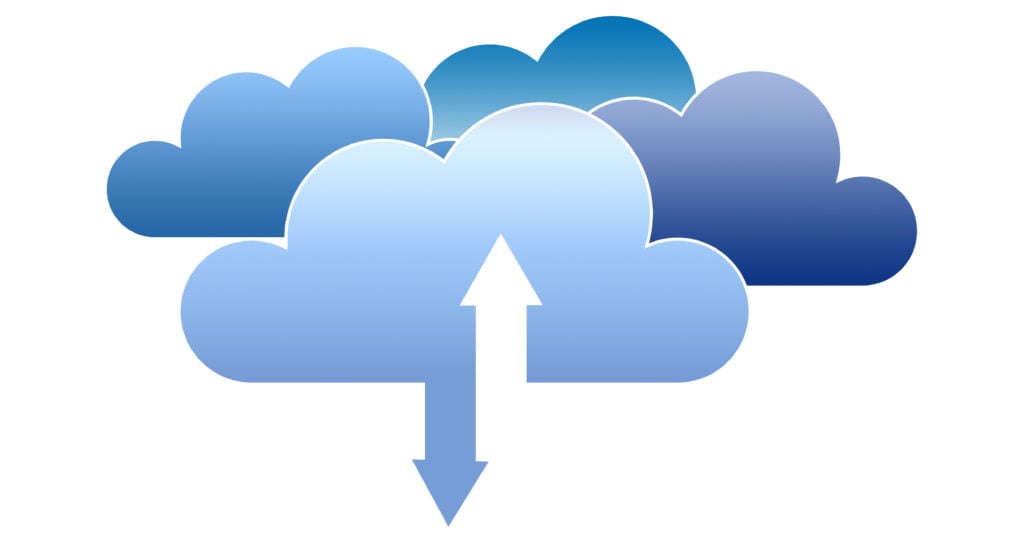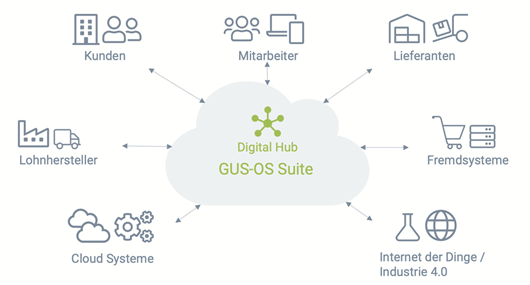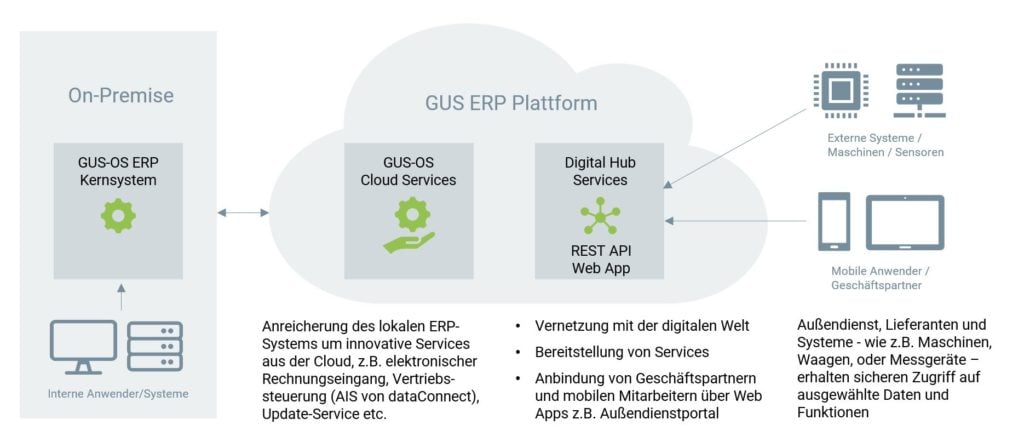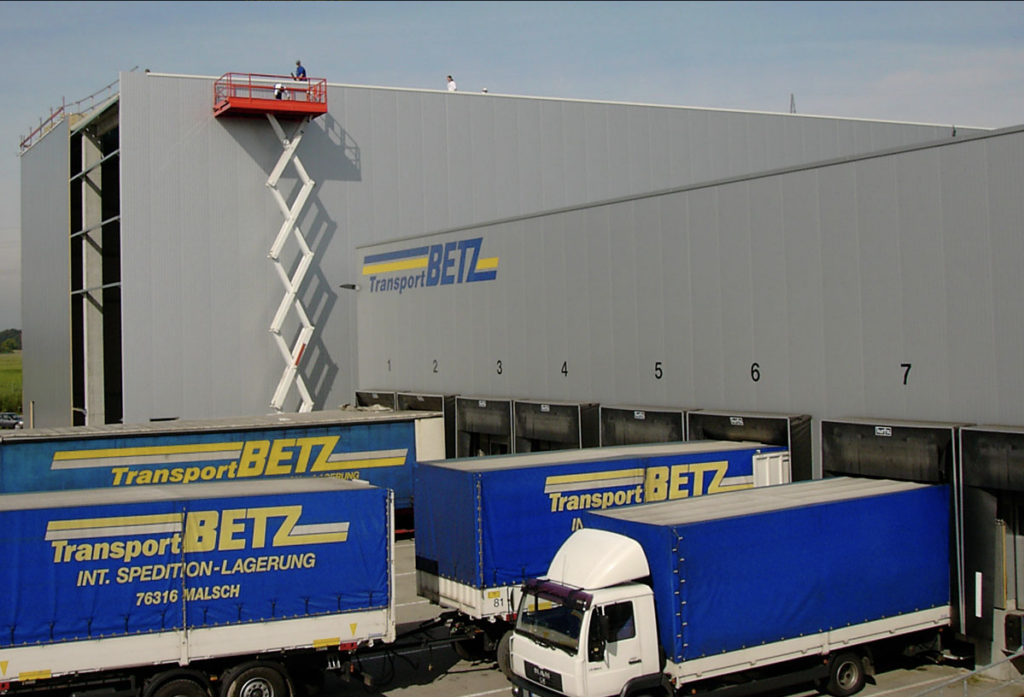The future of ERP

Big data, artificial intelligence (AI) and process mining have long since moved beyond buzzword status and are now significantly shaping current developments in the field of business software. However, not all current technology trends are equally relevant for ERP systems. For example, blockchain and virtual reality are only likely to play a role in peripheral areas in the near future. Even if there are interesting and established use cases (e.g. cryptocurrency, games), their potential business benefits in combination with ERP are considered to be quite low.
The situation is particularly different when it comes to the cloud. In principle, the cloud is very well suited as an operating and service platform for ERP solutions, where additional cloud services can also be integrated. In this case, the cloud acts as an integration platform. Another possibility arises from the scaling potential of the cloud: temporary computing power can be added for training AI models in company applications.
Does this mean that locally hosted ERP solutions are a discontinued model? The following three theses show where the journey is currently heading and what is important.

On-premise ERP solutions are often no longer sufficient
Many of today's business scenarios can no longer be mapped with traditional ERP suites: An increasing number of third-party systems, the seamless exchange of data with customers and partners and rapidly changing market requirements mean that monolithic architectures from the local data center no longer fit into today's world. Instead, it is digital networking across company boundaries that is now setting the pace. New cloud solutions are also constantly emerging: Most AI or IoT solutions, for example, are now offered in the form of cloud services.
Open interfaces are the be-all and end-all
There are still good reasons to use a ERP system to the cloud. Be it for data protection reasons, due to special functions, e.g. for machine control, or for performance reasons (for example, the bandwidth at the site is not sufficient for production control). But even in the cloud age, on-premise ERP systems will not become obsolete - as long as they enable interaction between the company's own platform and data-based cloud services, as well as other third-party systems. The business world is also becoming more complex and networked. The number of systems with which data needs to be exchanged is therefore increasing, to. Accordingly, the respective ERP system have open interfaces that ensure secure networking across system boundaries. Specifically, technological standards such as REST (Representational State Transfer) are a must, as they enable the exchange of data on distributed systems via interfaces. After all, if you want to optimally integrate your existing system landscape, you need connections between one or more cloud platforms and existing on-premise installations.
Hybrid architectures as the ideal solution?

Hybrid architectures are the solution of choice for combining the strengths of ERP systems with the requirements of today's networked company. With these, the core ERP system can continue to run on in-house servers, with a colocation provider or in a (private) cloud, but can also be specifically enhanced with additional cloud services. But the reverse is also possible: individual services of the ERP system, such as order entry or information on product availability, can be made available to customers and business partners - e.g. on their digital platforms.
The appeal of this is that companies retain full control over their data and the IT-side mapping of their core processes thanks to the hybrid approach. And thanks to the cloud, they also benefit from the networking of their existing IT with external partners and systems - especially in terms of scalability, flexibility, data protection, security and easy access to third-party systems.

The GUS Group knows and supports numerous user companies from the process industry that follow the three guidelines outlined here. Of course, they do this primarily to remain competitive in the long term and to keep their technological base fit for the future. The hybrid approach also makes something else possible: a pragmatic approach that does not completely reinvent the wheel - and therefore also meets the needs of medium-sized companies in particular, which generally like to take one step at a time (but are quicker to do so). Modern cloud solutions that are integrated with the ERP core system on site at the company allow this gradual transition.
Whether on-premise, hybrid or cloud: with the GUS Group at your side, you have a free choice. 100% flexible and a secure investment. Because we will continue to fully support all three models for you in the future.
Half of German companies have expanded their cloud use since the start of the coronavirus crisis
IT blogger Michael Kroker presented new figures from market researchers YouGov in his blog in May 2021: according to these, the trend towards cloud computing has been further strengthened by coronavirus. Almost half of companies in Germany have expanded their use of the cloud since the start of the pandemic. At the same time, however: "Only a seventh of them rely exclusively or predominantly on the public cloud model, in which a cloud infrastructure is shared by many companies." Instead, there is a clear preference for private clouds that are operated by the companies themselves or exclusively for them.
What the GUS Group has to say
The coronavirus pandemic has put cloud software in the spotlight once again, primarily because it was necessary to organize the relocation of countless employees to work from home. Cloud software has kept many work processes running that would otherwise have been difficult or impossible to continue. This includes not only collaboration solutions such as video conferencing, but also access to business software such as CRM or ERP. The cloud also makes it easier to link processes across companies, for example with partners along the supply chain. However, this assumes that the existing company software is already in the cloud or that individual functions can be provided in the cloud. This is possible with the GUS OS Suite 's Digital Hub Service, for example. This is a so-called hybrid approach, a combination of on-premise and cloud services.
76 percent of ERP solutions are now also provided as Software-as-a-Service (SaaS)
Despite this, 89% of ERP systems are still offered in the traditional in-house version. This was reported in the latest ERP study by management consultants Softselect. In 2021, sales of ERP solutions in Germany are expected to amount to around two billion euros. With regard to coronavirus, the authors of the study also state that those companies that have already obtained their ERP software and other operational systems via the cloud have experienced fewer restrictions in their familiar working environment than companies that operate their ERP exclusively in-house.
What the GUS Group has to say
As is so often the case, there is no silver bullet. Depending on requirements and the initial situation, both in-house and cloud/SaaS or hybrid solutions can be the right choice. The GUS OS suite offers all three models and also makes it easy to "switch", even at a later date.
While other providers without a cloud-native ERP solution have to resort to IaaS - the rental of virtual servers - in order to relocate existing solutions, such as on-premise, 1:1 to the cloud, the GUS-OS Suite technology stack also enables operation on Platform-as-a-Service (PaaS) offerings (e.g. Docker). This allows user companies to scale better and more cost-effectively without having to make a long-term commitment to a cloud provider.
46 percent of companies worldwide already use Software-as-a-Service (SaaS) or hybrid solutions for their HR work
This was reported in April 2021 by market researchers from the Information Services Group in their study on the current status of HR technologies. Two years earlier (2019), the figures were significantly lower. At that time, only 20 percent of companies stated that they operated cloud software as HR solutions.
What the GUS Group has to say
This highlight from the HR and CRM sector shows an increasingly open attitude towards the use of cloud services. However, this trend towards the cloud is somewhat more restrained in the ERP environment. Medium-sized companies in particular are more critical of the cloud, at the latest when it comes to product control (e.g. connecting machines) or handing over the "heart" of the company - the recipes or processes.
The reasons for this are mostly psychological: fear of losing control over particularly critical data, internet outages, uncertainty about compliance with the GDPR, concerns about high latency when using the cloud, etc.
The GUS OS Suite also takes this into account. With the hybrid solution of the GUS OS Suite, the core ERP system can still be operated on-premise, while at the same time connecting HR and CRM solutions to the cloud via an open and secure interface (e.g. REST). This creates an agile ecosystem with services from the cloud or other digital platforms with a secure connection to the local ERP system.
69 percent of all German ERP user companies consider the migration of their on-premises ERP to the cloud a success
In addition, 63% of companies that use a cloud-based ERP want to expand this solution in the next twelve months. These are the findings of a May 2021 study on cloud ERP conducted by the IT trade media CIO and Computerwoche together with partners. According to the study, smaller companies with fewer than 500 employees are particularly keen to invest, with 28% of them definitely intending to spend money on their cloud ERP. For medium-sized companies with 500 to 999 employees, the figure is 23 percent, and 22 percent for larger companies with 1,000 employees or more.
What the GUS Group says
The advantages of a cloud ERP are obvious: high flexibility, rapid scalability, use without local operating expertise, update services and much more. And yet the cloud is not a cure-all.
Anyone who believes that the cloud can conjure away process complexity will be disappointed and is putting their own ERP project at risk. This is because the introduction of a cloud ERP system is no less complex than that of an on-premise solution. An off-the-shelf or "standard" cloud solution can be implemented quickly, but is often only sufficient for very small companies. For most medium-sized companies, a cloud ERP system must also be adapted to the processes and integrated into the existing IT landscape.
With its ERP solution GUS-OS Suite, the GUS Group offers a holistically integrated software system that meets individual application requirements. Based on modern technology, the ERP suite is available to companies in the process industry and logistics both on-premise, as a hybrid and as a SaaS version (Software-as-a-Service) in the cloud. Companies therefore have the choice between these three models and can easily switch or upgrade their version. Even in a "pure" cloud scenario, the GUS OS Suite can comprehensively map the demanding industry-specific requirements of user companies with full update capability.
Many of the ERP solutions offered in Germany are focused on specific industry segments such as industry (71 percent), retail (65 percent) or services (63 percent).
The latest ERP study by management consultants Softselect also shows a significant increase in acceptance among IT managers with regard to SaaS solutions. According to the study, the main prerequisite for this acceptance is data processing within the EU. Overall, the range of ERP solutions is more diverse than ever before thanks to new cloud, mobile and industry solutions. When making a selection, questions about the optimal technology and the appropriate deployment model are also central.
What the GUS Group has to say
Against the backdrop of increasing process complexity in almost all industries, specialization in the respective industry requirements is proving to be indispensable today. Because only those who know the industry can map the relevant processes fully and competitively in accordance with legal regulations.
Founded in 1980, GUS offers fully integrated software solutions explicitly for companies in the process industry and logistics. The product portfolio supports the entire business cycle - from enterprise resource planning (ERP) to supply chain management (SCM), producer accounting (EVS), sales management and geomarketing, customer relationship management (CRM), laboratory information management(LIMS), quality management, finance/controlling and business intelligence through to document management. Today, GUS has unique industry expertise. With the GUS OS-Suite, user companies receive a solution tailored specifically to the needs of the batch-controlled industry at eye level, which has been developed consistently and with focus for over 40 years.
While most industry-independent ERP providers can only "verticalize" their solutions through cooperation with various implementation partners, GUS is continuously developing its industry-specific solution on its own.
In addition, a large number of ERP industry solutions are offered in the D/A/CH region today. These may be technically convincing, but most of them lag behind in terms of technology, as they often fail to make the "technology shift" that is essential today. The reason for this is often the size of the software company. With a small number of specialists, the future is only possible to a limited extent. Companies that want to introduce an ERP system or change providers are therefore well advised to pay attention to the industry focus and the size of the software companies in question.
The CIS has a modern IT architecture, is 100% web-based and ideally equipped for cloud and hybrid use. User companies benefit twice over: they can rely on the expertise of the industry specialist with the highest possible level of legal compliance and future-proofing.


